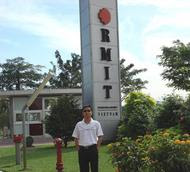Real GDP per capita: $35,100 (2007 esp.)
Life expectancy: 76.37 years
Adult literacy: 99%
Life expectancy: 73.05 years
Adult literacy: 92.4%
Life expectancy: 48 years
Adult literacy: 53.5%
Unfortunately, there is not a picture for VN but I think a typical VN family is not much difficult to find around VN countrysides or provinces. The chosen family could be one which has average income per person = $2,600 per year ($216 per month) within an area which has life expectancy = 68.52 years and adult literacy = 93.9%.
Those numbers tell us approximately how much, on average, productivity and well-being of a country. They don't tell us how healthy people are, are they happy and joyful, does their country have beautiful landscapes or famous history, are people brave and intelligent, do they have stable and effective government, how are their institutions, infrastructure, education, technology, innovation etc... Yet, the cause and effect reasoning could be applied to deduce the answer. GDP is not the perfect number but there are reasons (both obvious and subtle) to explain why such a country has that level of productivity. Well-being of a country relies on strengths, weaknesses of each and relationship of 3 economic entities: individual, organization and nation in which nation plays a governed role with underlying input factors: economic and political systems, transparency, political stability, international relations, history and culture...
However, VN government transparency is still a major problem. How much critical red-tape, bureaucracy and bribery issue is? Is wastefulness of government spending becoming nationwide? How much burden of government regulation? Is there reliable social supervision (television broadcasts, newspapers, radio, ...) which directly informs what are the citizen-government problems, how many VN citizens believe and happy with their government operation?
Why do people in so many places protest, sue government officials for their land dispute but our media communication still keeps silent? What law is this to arrest journalists? Is that Truong Sa, Hoand Sa islands already sold to China? How is VN national security system? How much is spent on education, infrastructure? Where tax revenue, FDI budget is going? The country interests and well-being are based on and being served for majority honest, sincere Vietnamese or just being served for small group of corrupted individuals?
Lots of questions but certainly any neutral Vietnamese could come with some similar, common answers. More important questions for the future are: could Vietnamese people organize into such a big, cohesive group to demonstrate their legitimate interests? Would we still have stable government institutions for the next 30-40 years when the background conflicts are becoming more and more profound? What are considered costs for VN (a country with beautiful landscapes, rich natural resources along with many peaceful, gentle, honest, intelligent people) to become a rich, developed country?
"When much is wrong, much needs to be hidden." At the individual, organization or nation level, a good life for many citizens is a strong, transparent and efficient nation for all.
References:
CIA - The World Fact Book: https://www.cia.gov/library/publications/the-world-factbook/geos/vm.html
Essentials of Economic (4th Edition) - N. Gregory Mankiw
3x3 Economic Integration Model (Tran, Schafer, Ogburn & To - 2002)







